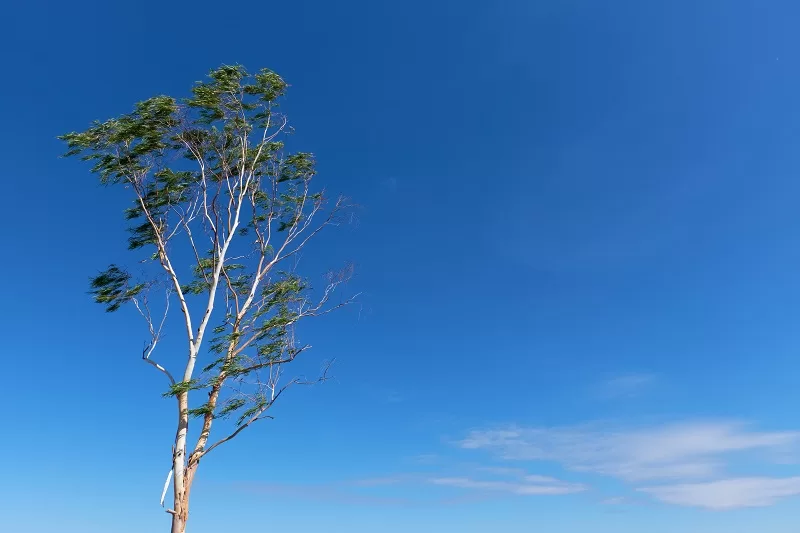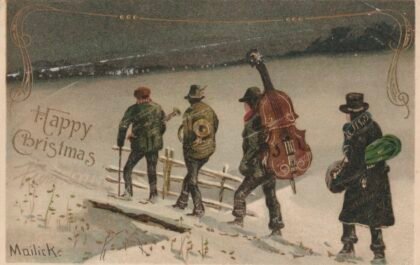The Coastwatchers chronicles the adventures of James Ellis Anderson, a young boy from Illinois sent to live with his eccentric aunt in Malibu during WWII. In the tradition of fiction from that period, TNT is presenting this original story by TNT Editor Suzanne Guldimann in serial installments. The first chapter, which introduces James and his Aunt Maddie, debuted in our November 4 2022 issue and is available online along with Chapters Two & Three.
Please join us, as we travel back in time to January 1942.

I woke up with a start in the morning. The window had banged open and a fierce wind was blowing. Outside, the air was full of dust, a golden haze. On the wall opposite the window, a shadow pattern of tree branches danced and shifted.
“It’s the Santa Ana wind,” Aunt Maddie explained, when I arrived in the kitchen. “It always comes this time of year. Breakfast in a minute, but first I have to check the animals. The wind makes them anxious. It makes me anxious, too.” She made a face. “Some people say it can drive you mad, but it just gives me hay fever and a headache.”
“I can help with the animals,” I said.
“Brace yourself then, that wind is blowing 60 mph at least,” she said, opening the door. The wind was hot, really hot. It seemed like a live thing. It came in gusts, roaring through the trees, kicking up dirt and leaves, then dying down for a second, like a monster pausing to take a deep breath.
The animals were in the barn. The horses were nervous. Ariel waltzed and danced each time a gust of wind rattled the building. Cosmo came over and pushed his head into Aunt Maddie’s jacket. The goats bleated out their Greek chorus. Once again I helped my aunt feed and water everyone.
“We’ll leave them in the barn for now, so no one gets spooked by the wind,” Aunt Maddie decided. “It usually dies down in the early afternoon.”
We met Mr Calzada on our way back to the house. He and Aunt Maddie had a hasty conversation in Spanish. I couldn’t understand it, but it sounded urgent.
“The power just went out,” Aunt Maddie shouted, over the wind. “There’s a tree down on the road. He’s going to help clear it. Come on, let’s check the hens.”
The hens and ducks seemed less disturbed than the larger animals. They made interested noises when we appeared, and ate their breakfast with enthusiasm.
We found two eggs. Aunt Maddie used them to make pancakes for breakfast. She cooked them over an old Primus stove, the kind you use for camping. They were really good, although Mrs Calzada clucked over the quantity of dirty dishes when she arrived.
The wind blew hard all morning.
Aunt Maddie’s house was solidly built. The thick walls deadened the horrific roaring of the windstorm, but the wind moaned down the chimneys and rattled the roof tiles. Outside, it was unbearable: loud as a squadron of aircraft. Dust was carried on currents of air under doors and through cracks in the windows. It even filtered down through the beams in the roof. Mouse the cat retreated under the bed in my room, frightened by the noise and the static electricity that made his coat and whiskers spark on contact.
“Come on, let’s go barricade ourselves in the living room until it dies down,” Aunt Maddie said. There’s no point in trying to work on a morning like this.”
⧫⧫⧫
The power was out, but the old phonograph with the lily-like bell didn’t need electricity. My aunt showed me how to crank the handle and let me pick a record to play. I wasn’t familiar with any of the names, but I thought that something called “Gardens in the Rain” sounded like a good choice to counter the wind.
The sound was tinny and old fashioned, but I was transfixed by the music. It wasn’t a catchy tune like the music on the radio my sister listened to. It wasn’t even pretty, exactly, but it really did sound like falling rain.
Unlike Aunt Charlotte, who would have demanded to know what I was thinking about, Aunt Maddie let me listen in peace. The silence when the last note died away came almost like a shock.
“Claude Debussy,” Aunt Maddie said. “He was a French composer, an impressionist who painted with music instead of on canvas. That performance was by William Murdoch, an Australian pianist. I met him once, just after the Great War. Music brings the world together, but not enough to prevent war from tearing it apart. He was brilliant with Debussy, and Chopin, too.”
“Chopin? I asked.
“Here.” Aunt Maddie pulled out another record. The name wasn’t spelled the way she pronounced it, but I carefully cranked the handle and dropped the needle on the disc. The first notes of Nocturne in E-flat major, Op. 9, No. 2, hung in the dusty air like motes of light. We ended up listening to records all morning—different composers, different periods, all of the recordings made long before I was born, but still somehow alive. I felt the way someone might if they were seeing in color for the first time.
⧫⧫⧫
The wind died down in the afternoon, just the way my aunt said it would. She disappeared into her office after lunch, and I slipped outside. The power was still out. I walked down the driveway to the road to see what had happened with the fallen tree. It was enormous. There was room now for a car to pass , but the bulk of the tree was still on the side of the road. The air was full of a strong medicinal smell. I found out later that this was a eucalyptus, a kind of Australian tree that they use to make cough drops and the kind of liniment they rub on your chest when you have a cold. No wonder it made me think of Aunt Charlotte.
There was no sign of Mr Calzada, but on my way back to the house I saw the man who lived in the other cottage. Well, I saw part of him. The top half of him was under the old car. He was swearing, the way people do when they are working on an engine. It was in another language. I didn’t understand it exactly, but I got the idea.
“Hello? Can I do anything to help?” I asked.
He emerged from the insides of the car and turned to look at me. He was tall but gaunt, as if he was ill, and his face was harrowed, as if he didn’t sleep enough, but he smiled at me, and that made him look less grim.
“Hello,” he responded. “Show me your hands, if you would?”
Puzzled, I held up my hands.
“Good! Mine are too big,” he held out his own—broad and long-fingered. “Do you think you can reach in there and feel for one of these?” He held up a small brass nut. “I dropped it, and I cannot reach in there to get it. There is no room. I was trying to reach it from below, but I could not.” He had just a trace of an accent, which you wouldn’t notice, except that he spoke English very formally.
I knew a little about cars. Father always had one. “A doctor needs a car,” he always said. The ones he had broke down often enough that I knew how they were supposed to work. I knew how to put oil in and I could change a spark plug, but this car engine looked like nothing on earth. What was under the hood looked more like Flash Gordon’s jet pack than anything else, but I was able to squeeze my hand in and retrieve the nut.
“What kind of a car is it?” I asked.
“It is a 1910 Durocar,” the man said.
“That’s really old!” I said. “How does it work? Can it still work? I never saw an engine like that.”
“It is a steam car, with four cylinders, and 24 horsepower,” he said. “It was built right here in Los Angeles in a world that wasn’t at war. Yesterday’s ‘car of tomorrow.’”
“I never heard of a Durocar before,” I said. “It’s amazing! Do you think you really can fix it?”
“I hope that I can,” he said. “Thank you for your help. You must be James, your aunt told me you would be coming. I am Franz Zelle. “I am happy to make your acquaintance.”
“Aunt Maddie said you are a musician, a composer,” I said, shaking hands.
“I am,” he said. “I tinker with the car in my spare time. I think perhaps if I can fix it, if I can make it go again, then perhaps there is hope that the world is not so broken that it cannot be fixed again in time.”
I wanted to ask him about composing, my mind was still on the music I had experienced just that morning, but he looked so bleak and pensive I couldn’t find the words. Instead, I found myself saying, “Could I help with the car?”
“Thank you. I would like that,” he said, gravely. “But, we finish for today. The wind is rising again, I think.”
It was. I helped Mr Zelle cover the old car with a tarp as the wind swept in again. It roared like an express train, and snatched at the tarp and the ropes we were using to secure it. When we were finished, he nodded at me and disappeared into his cottage, pausing for a moment to let the orange cat go in first.
⧫⧫⧫
I stopped to say hello to the horses and the goats on my way back to the house. The wind tugged at my clothes and spun the dust in the corral into a whirlwind spiral, gathering in leaves and bits of straw, then scattering it with a sound like hailstones. As I walked back past Franz Zelle’s cottage, I heard the sound of piano notes—strange and dissonant, but compelling.
They held, I thought, some of the wild fury of the windstorm.




